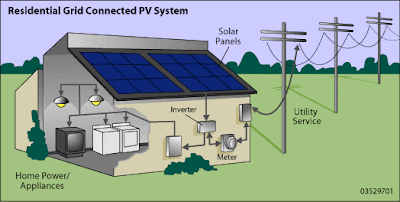Installing a solar power system requires very careful initial planning. First of all, you need to know exactly how much electricity your home uses each month. You may look up in your old electricity bills but also you should think about how your electricity needs will change over the next 10 years.
Solar photovoltaic panels can be installed on the roof, along a wall of the property or as standalone systems. If you are planning to install them on your roof, you need to make sure that the roof is strong enough to hold a solar panel because some of these panels can be quite heavy. A roof inspection (and any necessary repair) is recommended prior to a PV installation. Another thing you need to know is that the more sunlight modules collect, the more electricity they produce, thus the more energy your home will receive. Make sure that the roof (or wherever you intend to install your solar panels) is clear of any obstacles, such as trees or buildings, especially during peak production hours between 10am and 2pm.
Ideally, a solar system will go on a south/southwest-facing roof, although east and west facing roofs are good candidates, as well.
You should decide whether your system will be grid-connected, off-grid or hybrid. With a solar PV system connected to an electric distribution system (grid-connected) you can receive back-up power from it when your system doesn’t produce enough energy for your needs. When your solar PV system produces excess power, that electricity can be send back into the grid, and your local utility is required to buy it from you.
Solar photovoltaic panels can be installed on the roof, along a wall of the property or as standalone systems. If you are planning to install them on your roof, you need to make sure that the roof is strong enough to hold a solar panel because some of these panels can be quite heavy. A roof inspection (and any necessary repair) is recommended prior to a PV installation. Another thing you need to know is that the more sunlight modules collect, the more electricity they produce, thus the more energy your home will receive. Make sure that the roof (or wherever you intend to install your solar panels) is clear of any obstacles, such as trees or buildings, especially during peak production hours between 10am and 2pm.
Ideally, a solar system will go on a south/southwest-facing roof, although east and west facing roofs are good candidates, as well.
You should decide whether your system will be grid-connected, off-grid or hybrid. With a solar PV system connected to an electric distribution system (grid-connected) you can receive back-up power from it when your system doesn’t produce enough energy for your needs. When your solar PV system produces excess power, that electricity can be send back into the grid, and your local utility is required to buy it from you.

Picture: apps1.eere.energy.gov
A grid-connected solar power system is easily integrated into the existing electrical infrastructure of a house and the system can provide decades of reliable and environmental friendly electricity production.
A stand-alone (off-grid) solar PV system is independent of an electricity distribution grid operated by a utility. The electricity is provided by solar power alone and stored in a battery for later use. Such systems typically make sense in remote locations.
The average solar PV panel last approximately 30 years and many manufacturer warranties last for up to 20-25 years. Solar PV panels are designed and installed to be low-maintenance. However, it is very important to have your solar panels cleaned regularly because they benefit from being hosed off with water twice a year, especially after long periods without rain. Dust or dirt may cause a 10-15% reduction in their efficiency.
Before buying and installing the panels it is also essential to make sure that you understand the installation regulations in your local area. In most cases it is wise to check with the local authority before installing your solar electric system.
A stand-alone (off-grid) solar PV system is independent of an electricity distribution grid operated by a utility. The electricity is provided by solar power alone and stored in a battery for later use. Such systems typically make sense in remote locations.
The average solar PV panel last approximately 30 years and many manufacturer warranties last for up to 20-25 years. Solar PV panels are designed and installed to be low-maintenance. However, it is very important to have your solar panels cleaned regularly because they benefit from being hosed off with water twice a year, especially after long periods without rain. Dust or dirt may cause a 10-15% reduction in their efficiency.
Before buying and installing the panels it is also essential to make sure that you understand the installation regulations in your local area. In most cases it is wise to check with the local authority before installing your solar electric system.



2 comments:
hello! just dropping ECards..how are u?care for ex links?
visit my sites:
www.walkingnewspaper.blogspot.com www.pinoymedicaldoctor.blogspot.com
take care!
Just to let you know you have won the I love your blog award!
http://goalforthegreen.com/2008/12/wowanother-award/
Post a Comment